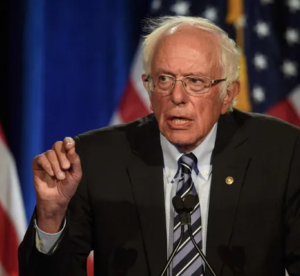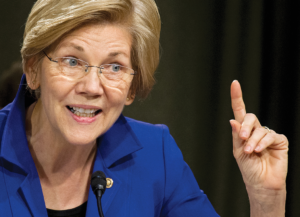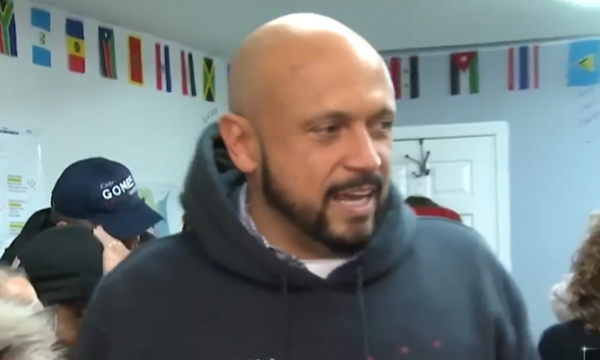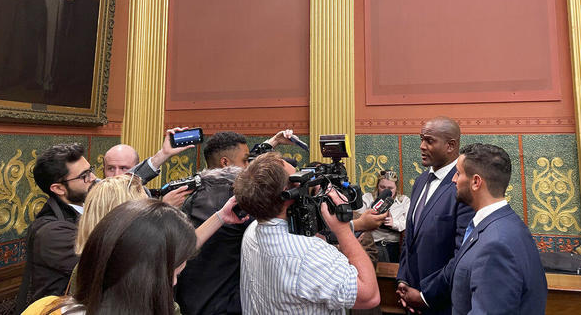Some Seeking Cabinet Posts Likely Stymied by Tight Contest for Control of the Senate
After losing the Democratic presidential nomination to Joe Biden, Sen. Bernie Sanders of Vermont really wants to be his Labor Secretary.
“If I had a portfolio that allowed me to stand up and fight for working families, would I do it?” Sanders told CNN on Wednesday. “Yes, I would.”

Sen. Bernie Sanders
The thought of a self-styled Democratic Socialist in any cabinet role is anathema to Republicans, of course. But a bigger obstacle for Sanders might be the delicate party balance in the Senate, where President-elect Biden will need every Democratic vote to advance his agenda.
Republicans have already won 50 seats in next year’s Senate, leaving Democrats clinging to the hope of winning two run-off elections in Georgia to secure a 50-50 tie. In the event of a split chamber, Vice President–elect Kamala Harris would provide the deciding vote to hand Senate control to the Democrats.
But if Biden were to name Sanders to the cabinet, his Senate seat would be filled by Republican Gov. Phil Scott, pending a special election within six months.
Such a slender majority would mean that Senate Democrats could not afford to lose a single member. Even a delay in seating a Democratic replacement could be problematic.
Massachusetts Sen. Elizabeth Warren is in a similar bind.
Warren, who made her name as founder and head of the Consumer Financial Protection Bureau, has made clear that she wants to be Treasury Secretary. But like Sanders she represents a state helmed by a Republican governor, Charlie Baker, who, under current law, would name someone to hold her Senate seat for at least 145 days.

Sen. Elizabeth Warren
In this case Warren (like fellow Massachusetts senator Ed Markey) is marginally better positioned than Sanders, in at least one respect. Democrats enjoy a supermajority in the Massachusetts legislature, and in recent years they have twice changed the law that governs how such vacancies are filled. A freshman legislator also recently filed a budget amendment that would dictate that Baker could only replace a Democratic senator with someone from his or her party. House leaders shot down this amendment Thursday night, but not before Gov. Baker pledged to veto it.
The legislature could still push through a rules change over Baker’s objections, but to what end? “I doubt very much that Secretary Warren would be on the nominating table,” Sen. Pat Toomey (R-PA) told The Hill, “because the governor of Massachusetts is a Republican and replacing her with a Republican senator probably wouldn’t go really well with Sen. Schumer.”
Rhode Island Sen. Jack Reed, frequently touted as a candidate for Defense Secretary, faces a different dilemma.
Rhode Island has a Democratic governor, but state law does not allow Gina Raimondo to fill a Senate vacancy, even temporarily. If Biden were to tap Reed, his seat would remain empty until a special election could be held.
Sen. Chris Murphy, often mentioned as a candidate for Secretary of State, hails from Connecticut, which has a Democratic governor, Ned Lamont. But Lamont would only be able to fill Murphy’s seat for 7-8 months before a special election would need to be called. Connecticut, too, is a “blue” state, but here the GOP is more competitive, so replacing Murphy would invite a high-stakes special election.

Sen. Martin Heinrich
The same might be true for freshman Sen. Tammy Duckworth of Illinois (also touted for both Defense and Veterans’ Affairs), who unseated former Republican senator Mark Kirk in 2016 with 54% of the vote. Generally, though, other U.S. senators from outside New England would seem to face an easier path. Chris Coons of Delaware (State) and Martin Heinrich of New Mexico (Interior) both come from states that allow their Democratic governors to fill Senate seats for a full two years. The same is true for Minnesota’s Sen. Amy Klobuchar, whom Biden is reportedly considering for both secretary of agriculture and attorney general (triggering a strange response in the Minnesota Senate).
Two senators that Biden could safely name to cabinet posts are New Mexico’s Tom Udall (Interior) and Alabama’s Doug Jones (Justice). Udall declined to run for re-election this year, while Jones was defeated in his first bid for a full Senate term.
Before counting Sen. Sanders out, however, consider that Gov. Scott might not take advantage of an opportunity to add to the Senate’s Republican delegation.
Scott told Seven Days last February that if Sanders became president he might not appoint a Republican. “I’d probably try to find an independent who is not affiliated with either party and not seeking to become the next senator,” he said at that time.

Vermont Gov. Phil Scott
Last month Scott doubled down on that prediction. “I want this to be fair,” he said, adding that he now would tend to look to appoint “a more left-leaning type of independent” who would caucus with the Democrats.
That has to be reassuring to Sen. Sanders. The question then becomes, would President-elect Biden have enough trust in Scott’s bona fides to take him up on this apparent pledge?
Perhaps not. “I think the vice president understands that politics is a game of addition and multiplication, not subtraction and division,” Democratic strategist Antjuan Seawright suggested recently. “I can’t see a scenario where [Biden] will risk losing numbers in the Senate that he would need to deliver an agenda that is so critical.”


